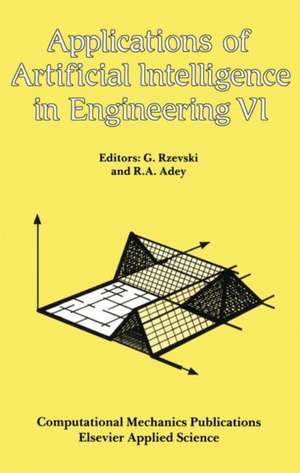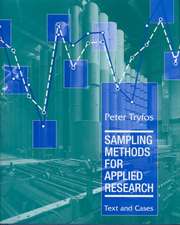Applications of Artificial Intelligence in Engineering VI
Editat de George Rzevski, R.A. Adeyen Limba Engleză Hardback – 31 iul 1991
Preț: 485.69 lei
Nou
Puncte Express: 729
Preț estimativ în valută:
92.95€ • 96.68$ • 76.73£
92.95€ • 96.68$ • 76.73£
Carte tipărită la comandă
Livrare economică 10-16 aprilie
Preluare comenzi: 021 569.72.76
Specificații
ISBN-13: 9781851666782
ISBN-10: 1851666788
Pagini: 1064
Ilustrații: XI, 1052 p.
Dimensiuni: 152 x 229 mm
Ediția:1991
Editura: SPRINGER NETHERLANDS
Colecția Springer
Locul publicării:Dordrecht, Netherlands
ISBN-10: 1851666788
Pagini: 1064
Ilustrații: XI, 1052 p.
Dimensiuni: 152 x 229 mm
Ediția:1991
Editura: SPRINGER NETHERLANDS
Colecția Springer
Locul publicării:Dordrecht, Netherlands
Public țintă
ResearchCuprins
Section 1: Engineering Design.- Genetic Algorithms as a Computational Theory of Conceptual Design.- Pre-schematic Electronic Circuit Designer.- Expert Systems in Mechanical Engineering Design.- Numerical Methods in AI-Based Design Systems.- A Knowledge Based System to Automate Manufacturing and Design Engineering.- HYPERARCHITECTURES - A New Multidimensional and Humanistic Scheme for CAAD.- An Integrated Approach to the Automation of Class Three Electronic Design Problems.- Design Brief Expansion Tool.- An Integrated System for Constructibility Assessment of a Design Detail.- Knowledge Based System for Geometry Features Reasoning from Three-Dimensional CAD Data.- Insights into Cooperative Group Design: Experience with the LAN Designer System.- Decomposition of Design Activities.- Mixpert: A Maintainable Configurer’s Assistant.- Design of Breakwaters using Knowledge-Based Techniques.- Controlling Database Integrity.- Intelligent Conceptual Design for Mechanical Systems.- Design and Implementation of a Prototype Intelligent System for Evolution Design of Dynamic Objects.- Evolutionary Inheritance and Delegation as Mechanisms in Knowledge Programming for Engineering Product Design.- An Expert System for Ergonomic Workplace Design Using a Genetic Algorithm.- Section 2: Engineering Analysis and Simulation.- Hierarchical Qualitative Simulation for Large Scale Dynamical Systems.- Intelligent Support of Flight Experimental Design and Analysis.- A Knowledge Based System for Material Preheat in Welding.- HardSys/HardDraw: A Smart Topology Based Electromagnetic Interaction Modelling Tool.- Drilling Tool Selection Aid System.- Structured Selection Problem in Pavement Rehabilitation.- HyperQ/Process: An Expert System for Manufactuing Process Selection.- Neural Networks in theColour Industry.- The Design of a Simulator System for Educating Engineers.- Section 3: Planning and Scheduling.- Process Parameter Origination using a Combination of Knowledge Based Paradigms.- Real-Time Means Planning Ahead to Look Back.- Resource Leveling in PERT by Neural Network.- CONTRALTO: Constraint Reasoning Applied to Logistics for Transport Organisations.- RAPS - A Rule-based Language for Specifying Resource Allocation and Time-tabling Problems.- KBS in Marine Collision Avoidance.- An Expert System Tool to Aid Production Schedulers.- Section 4: Monitoring and Control.- A Real Time Interpretation Model.- A New Method to Obtain the Relation Matrix for Fuzzy Logic Controllers.- Using Process Knowledge for Adaptive User Interfaces.- Intelligent Machine Tools: An Application of Neural Networks to the Control of Cutting Tool Performance.- Studies in A.I. Augmented Control Systems using the BOXES Methodology.- Artificial Neural Network for Alarm-State Monitoring.- Design and Experimentation of a Shell to Develop Knowledge Based Systems for Spacecraft Control.- Coupling Expert Systems on Control Engineering Software.- Real-Time Drought Control of Storage Reservoir by Combining Middle and Long-Term Weather Forecast and Fuzzy Inference.- Vehicles Controlling: Representation of Knowledge and Algorithms of Multi-Agent Decision.- Section 5: Diagnosis, Safety and Reliability.- DIPLOMA - The Seal of Approval.- Knowledge Based System for Fault Diagnosis of a Hot Strip Mill Downcoiler.- Towards an Automated FMEA Assistant.- Generic Diagnosis for Mechanical Devices.- Fault Detection in Digital Filters for Satellite Systems.- Section 6: Robotics.- The Co-operative Behavior of Multirobot Systems.- Piecewise Straight-Line Correlation Algorithm for Feedback Navigation Systems with Robotic Applications.- A Multiple Views Robotic Stereo Method for 3-D Shape Perception.- Section 7: Knowledge Elicitation and Representation.- Data Acquisition and Expert Knowledge Elicitation for Expert Systems in Construction.- Representing the Engineering Description of Soils in Knowledge Based Systems.- Section 8: Theory and Methods for System Development.- Expert System Verification and Validation Part I: Defining the Concepts.- Expert System Verification and Validation Part II: Implementing the Concepts.- Development of a Systems Theory using Natural Language.- Computer Aided Validation Expert System.- Fuzzy Boxes As An Alternative to Neural Networks for Difficult Control Problems.- Optimal Solutions for Deep and Shallow Engineering Expert Systems.- Optimisation of Neural-Network Structure using Genetic Techniques.- Interval Algebras and Order of Magnitude Reasoning.- An Algorithm for the Automated Generation of Rheological Models.- Expert’s Interface in a Generator of Process Supervision Systems: Relational Management of an Object-Oriented Knowledge.- Default Reasoning in Dipsy-E System.- Knowledge-Based Modelling Systems for Research of Engineering Objects.- Integration of Natural Language in Developing the Inference Mechanism Provides Powerful Benefits for Engineering Applications.- Organizational System as Hierarchy of Information Processes.- Authors’ Index.















